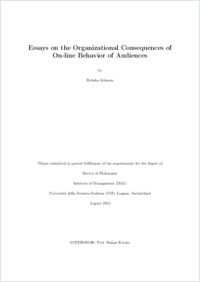Essays on the organizational consequences of on-line behavior of audiences
- Johnson, Rebeka
- Kovács, Balázs (Degree supervisor)
-
16.09.2015
135 p
Thèse de doctorat: Università della Svizzera italiana, 2015
Organizations’ on-line behavior
On-line versus off-line communication
Audience behavior
Social influence
English
Over the past 2 decades, internet use has become increasingly more a part of our every-day lives. We communicate with our friends and colleagues using the internet, we work using the internet, we also shop using the internet. We learn and increase our knowledge from information available on the internet. While on the one hand, we advance from the instant access to online contexts individualistically, on the other hand we participate as members of a community for example when we share our experiences online. The ever growing use of the internet and its flourish in new segments of our daily life brings significant changes not only to us, the individuals, but also to the organizations. In the past decade, there has been a shift in the field of organizational theory considering the environment of organizations. Current approaches extend the horizon of the classical view proclaiming that organizational environment is not only constituted by rival organizations but also their audience members. Several studies found evidence that audience members' perceptions and behavior influence organizational success. For example, category-spanning organizations on average suffer from social and economic disadvantages in markets because they cannot meet the expectations of their audiences. This shift towards understanding the effect of audience responses on the organizational outcome motivates my dissertation. More specifically, I study how individuals on-line behavior affects organizations. I analyze three aspects of internet mediated communication and their consequences to the organization. Firstly, I address the need to compare how traditional face-to-face communication compares to the modern email communication (Chapter 2). Studies tend to take it for granted, that on-line information exchange mirrors it's off-line counterpart at the work place. Although, there are great advantages in the availability of email data, as it retains communication in its completeness, it does not fully correspond to previously studied relations, like friendship or advice seeking. The characteristics of on-line communications also differ from off-line information exchange. Employees respect divisional and hierarchical boundaries in face-to-face conversations while these boundaries are blurred out within the email exchange. Secondly, I analyze a special type of on-line behavior, the on-line word-of-mouth communication among audience members (Chapter 3). Online reviews play an increasingly important role in shaping organizational performance. Drawing conclusions on how customers perceive quality and typicality of a producer and how it manifests in on-line ratings increase the predictability of producer success. Thirdly, I approach audience behavior from a collective behavior perspective (Chapter 4). Specifically, I analyze audience dynamics with threshold models. Doing so I address the micro level mechanism of how audience behavior creates certain macro level patterns of producer success rather than assuming that they are simple aggregates of individual characteristics.
- Language
-
- English
- Classification
- Economics
- License
-
License undefined
- Identifiers
-
- RERO DOC 258767
- URN urn:nbn:ch:rero-006-115019
- ARK ark:/12658/srd1318762
- Persistent URL
- https://n2t.net/ark:/12658/srd1318762
Statistics
Document views: 307
File downloads:
- Texte intégral: 193
